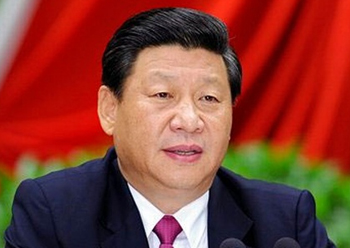New Delhi, Sep 17: China is ready to contribute to India's development with its rich experience in infrastructure building and manufacturing and Indian IT and pharma companies are welcome to seek business opportunities in the Chinese market, Chinese President XI Jinping has said as he arrives in India on a three-day visit.
 In an special article titled "Towards an Asian century of prosperity" in the Hindu daily, Xi said that "the combination of the 'world's factory' (China) and the 'world's back office' (India) will produce the most competitive production base and the most attractive consumer market".
In an special article titled "Towards an Asian century of prosperity" in the Hindu daily, Xi said that "the combination of the 'world's factory' (China) and the 'world's back office' (India) will produce the most competitive production base and the most attractive consumer market".
He said India under the new government of Prime Minister Narendra Modi is committed to building a strong and modern "Shreshtha Bharat", and India and China need to connect their development strategies closely and jointly pursue their common dream of national strength and prosperity.
Visiting India, "an enchanting and beautiful land that has captured world attention" after 17 years, Xi says that "the 'Story of India' has spread far and wide".
"With the new government coming into office, a new wave of reform and development has been sweeping across India, greatly boosting the confidence of the Indian people and attracting keen international interest in its opportunities."Xi wrote that ties between India and China "have made significant progress in the new century".
"The strategic and cooperative partnership for peace and prosperity has been established. China has become India's largest trading partner, with their bilateral trade volume increasing from less than $3 billion early this century to nearly $70 billion. Mutual visits reached 820,000 last year. We have had close coordination and cooperation on climate change, food security, energy security and other global issues and upheld the common interests of our two countries as well as the developing world as a whole."
On the festering boundary issue, Xi says: "Progress has been made in the negotiations on the boundary question, and the two sides have worked together to maintain peace and tranquillity in the border area. China-India relations have become one of the most dynamic and promising bilateral relations in the 21st century."
"Our bilateral relations have reached where they are today as a result of the following efforts: we have deepened mutual trust by strengthening strategic dialogue and enhancing political confidence; we have brought more benefits to each other by expanding the areas of cooperation and making the pie of common interests bigger; we have forged closer friendship by encouraging more people-to-people exchanges and cementing popular support for our bilateral relations; and we have treated each other with sincerity by respecting and accommodating each other's concerns and properly managing problems and differences."
He says that both countries are now "in a crucial stage of reform and development". The Chinese "are committed to realising the Chinese dream of great national renewal" and deepening reform in all sectors.
"The goal has been set to improve and develop the socialist system with Chinese characteristics and advance the modernisation of national governance system and capability. A total of over 330 major reform measures covering 15 areas have been announced and their implementation is well underway."
He said Modi is keen to provide a clean and efficient administration and improve infrastructure and "The Indian people are endeavouring to achieve their development targets for the new era".
"China and India are both faced with historic opportunities, and our respective dreams of national renewal are very much aligned with each other. We need to connect our development strategies more closely and jointly pursue our common dream of national strength and prosperity."
He said both countries "need to become closer development partners who draw upon each other's strengths and work together for common development".
"As the two engines of the Asian economy, we need to become cooperation partners spearheading growth. I believe that the combination of China's energy plus India's wisdom will release massive potential."
He pushed for his Silk Corridor project, saying India and China "need to jointly develop the BCIM (Bangladesh-China-India-Myanmar) Economic Corridor, discuss the initiatives of the Silk Road Economic Belt and the 21st Century Maritime Silk Road, and lead the sustainable growth of the Asian economy."
"As two important forces in a world that moves towards multipolarity, we need to become global partners having strategic coordination." According to Modi, China and India are "two bodies, one spirit".
"I appreciate this comment. Despite their distinctive features, the 'Chinese Dragon' and the 'Indian Elephant' both cherish peace, equity and justice. We need to work together to carry forward the Five Principles of Peaceful Coexistence (the Panchsheel), make the international order more fair and reasonable, and improve the mechanism and rules of international governance, so as to make them better respond to the trend of the times and meet the common needs of the international community."
Xi said he looks "forward to an in-depth exchange of views with Indian leaders on our bilateral relations during the visit, and to injecting new vitality to our strategic and cooperative partnership for peace and prosperity".
"I am confident that as long as China and India work together, the Asian century of prosperity and renewal will surely arrive at an early date."






Comments
Add new comment